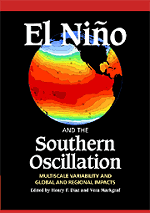Book contents
- Frontmatter
- Contents
- Contributors
- Acknowledgments
- Preface
- SECTION A Global and Regional Characteristics and Impacts of ENSO Variability
- SECTION B Long-Term Changes in ENSO: Historical, Paleoclimatic, and Theoretical Aspects
- 7 The Documented Historical Record of El Niño Events in Peru: An Update of the Quinn Record (Sixteenth through Nineteenth Centuries)
- 8 Tree-Ring Records of Past ENSO Variability and Forcing
- 9 The Tropical Ice Core Record of ENSO
- 10 Long-Term Variability in the El Niño/Southern Oscillation and Associated Teleconnections
- 11 Modulation of ENSO Variability on Decadal and Longer Timescales
- 12 Global Climate Change and El Niño: A Theoretical Framework
- 13 The Past ENSO Record: A Synthesis
- Index
11 - Modulation of ENSO Variability on Decadal and Longer Timescales
from SECTION B - Long-Term Changes in ENSO: Historical, Paleoclimatic, and Theoretical Aspects
Published online by Cambridge University Press: 04 August 2010
- Frontmatter
- Contents
- Contributors
- Acknowledgments
- Preface
- SECTION A Global and Regional Characteristics and Impacts of ENSO Variability
- SECTION B Long-Term Changes in ENSO: Historical, Paleoclimatic, and Theoretical Aspects
- 7 The Documented Historical Record of El Niño Events in Peru: An Update of the Quinn Record (Sixteenth through Nineteenth Centuries)
- 8 Tree-Ring Records of Past ENSO Variability and Forcing
- 9 The Tropical Ice Core Record of ENSO
- 10 Long-Term Variability in the El Niño/Southern Oscillation and Associated Teleconnections
- 11 Modulation of ENSO Variability on Decadal and Longer Timescales
- 12 Global Climate Change and El Niño: A Theoretical Framework
- 13 The Past ENSO Record: A Synthesis
- Index
Summary
Abstract
The mechanisms for decadal and longer timescale variability in the El Niño/Southern Oscillation (ENSO) phenomenon are examined. Decadal variability may be caused by factors internal to the tropical climate system, such as synoptic variability, or by those external to it, such as the so-called North Pacific gyre mode. Model evidence for these mechanisms is carefully considered.
Longer term variability of ENSO caused by such factors as global warming is also examined. Modeling evidence to date suggests little future change in ENSO due to this change in forcing. The limitations of models making such null projections are critically analyzed.
Introduction
The past fifteen years has seen significant advances in our understanding of the interannual aspects of El Niño/Southern Oscillation (ENSO). This has been achieved mainly as a result of the immensely successful Tropical Ocean-Global Atmosphere (TOGA) program. These advances have been accompanied by great progress in recent years in the development of realistic coupled ocean-atmosphere models, which are fundamental to increasing our understanding of the ENSO-coupled climate phenomenon.
While the dominant timescale usually associated with ENSO is interannual (roughly 2 to 7 years), it is quite clear from observational studies that the spectral peak is broad and has power at decadal and longer time scales. Although an understanding of this low-frequency signal is more limited, significant progress has been made in the past five years. This effort has been built upon the foundations of our knowledge regarding interannual timescales of climatic variability.
- Type
- Chapter
- Information
- El Niño and the Southern OscillationMultiscale Variability and Global and Regional Impacts, pp. 411 - 440Publisher: Cambridge University PressPrint publication year: 2000



